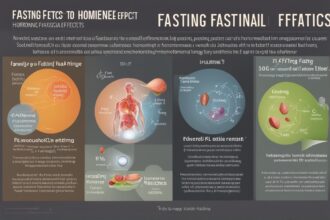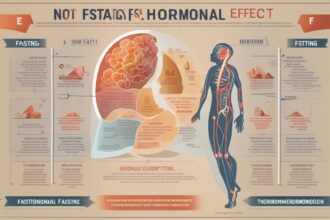Hey there, fellow health enthusiasts! If you’ve ever dabbled in fasting—whether it’s intermittent fasting, a 24-hour fast, or even a longer water fast—you’ve probably wondered how it impacts your body beyond just weight loss. One of the most fascinating aspects of fasting is its profound effect on your hormones. Yes, those tiny chemical messengers in your body, often called fasting hormones, play a massive role in how fasting influences metabolism, energy, mood, and even long-term health. In this deep dive, we’re going to unpack the science behind hormonal changes during fasting, explore which hormones are most affected, and share practical tips to optimize your fasting journey. Let’s get started on understanding how fasting and hormones are intertwined!
What Are Fasting Hormones and Why Do They Matter?
When we talk about fasting hormones, we’re referring to the hormones that shift in response to periods of food restriction. Hormones like insulin, cortisol, growth hormone, and others act as the body’s communication system, telling your cells how to handle energy, stress, and repair. Fasting flips a metabolic switch, moving your body from a “fed” state to a “fasted” state, and this transition triggers significant hormonal changes. These shifts are why fasting can lead to benefits like improved insulin sensitivity or fat loss, but they can also cause challenges like hunger spikes or fatigue if not managed well. Understanding these hormonal effects is key to maximizing the benefits of fasting while minimizing potential downsides (Fung, 2016).
Key Hormones Affected by Fasting
Let’s break down the major players in the world of fasting hormones. Each of these hormones responds uniquely to fasting, influencing everything from your energy levels to how your body burns fat. Here’s a closer look at the most critical ones and how they adapt during a fast.
- Insulin: Often called the “storage hormone,” insulin drops significantly during fasting. Lower insulin levels signal your body to burn stored fat for energy, a process central to fasting’s weight loss benefits (Meijssen et al., 2001).
- Cortisol: This stress hormone can rise during fasting as your body adapts to the lack of incoming energy. While this helps mobilize energy stores, prolonged elevation might lead to stress or sleep issues if not balanced (Cahill, 2006).
- Growth Hormone (GH): Fasting boosts GH secretion, which supports fat burning and muscle preservation. This is one reason fasting is popular among those looking to maintain lean mass (Ho et al., 1988).
- Glucagon: As insulin falls, glucagon rises to maintain blood sugar by breaking down stored glycogen in the liver. It’s like the yin to insulin’s yang during a fasted state (Unger & Cherrington, 2012).
- Leptin and Ghrelin: These hunger hormones fluctuate during fasting. Ghrelin (the “hunger hormone”) may spike initially, while leptin (the “satiety hormone”) drops, influencing appetite (Klok et al., 2007).
How Fasting Hormones Impact Metabolism and Weight Loss
One of the biggest draws of fasting is its impact on metabolism, and fasting hormones are at the heart of this process. When you fast, the drop in insulin and rise in glucagon and growth hormone push your body into a state of fat-burning, or lipolysis. This hormonal shift allows your body to tap into fat stores for fuel, which is why intermittent fasting and other fasting protocols are so effective for weight management. Additionally, fasting can improve insulin sensitivity over time, meaning your body becomes more efficient at using glucose—a game-changer for those at risk of type 2 diabetes (Halberg et al., 2005). However, it’s not all smooth sailing; elevated cortisol from prolonged fasting might slow metabolism if stress isn’t managed, so balance is key.
The Emotional and Physical Side Effects of Hormonal Shifts
While the metabolic perks of fasting are exciting, the hormonal rollercoaster can also bring some less pleasant side effects. Have you ever felt irritable or “hangry” during a fast? That’s likely due to fluctuations in fasting hormones like ghrelin and cortisol. Ghrelin spikes can make you feel ravenous, while cortisol’s stress response might leave you on edge. Physically, low insulin and blood sugar can cause fatigue or dizziness, especially if you’re new to fasting. The good news? These effects often lessen as your body adapts to fasting over time. Listening to your body and adjusting your fasting schedule can help ease these hormonal hiccups (Cahill, 2006).
Practical Tips to Balance Fasting Hormones
Navigating the hormonal effects of fasting doesn’t have to be a struggle. With a few tweaks, you can support your body’s natural balance of fasting hormones and make the experience more sustainable. Whether you’re doing a 16:8 intermittent fast or a multi-day fast, these strategies can help you feel your best while reaping the benefits of hormonal optimization.
- Start Slow: If you’re new to fasting, begin with shorter windows (like 12:12) to let your hormones adjust gradually without major stress responses.
- Stay Hydrated: Dehydration can exacerbate cortisol spikes, so drink plenty of water, and consider adding electrolytes during longer fasts.
- Manage Stress: High cortisol can derail fasting benefits, so incorporate mindfulness practices like meditation or deep breathing to keep stress in check.
- Break Your Fast Wisely: Avoid heavy, sugary meals when breaking a fast; opt for balanced options with protein and healthy fats to stabilize insulin and hunger hormones.
Who Should Be Cautious with Fasting and Hormonal Changes?
While fasting can be a powerful tool for many, it’s not a one-size-fits-all solution. Certain groups need to approach fasting with caution due to how fasting hormones might affect their health. For instance, pregnant or breastfeeding women should avoid fasting, as hormonal shifts could impact nutrient availability for themselves and their babies. People with conditions like diabetes or adrenal insufficiency should consult a healthcare provider, as fluctuations in insulin and cortisol can be risky without proper monitoring (Fung, 2016). If you have a history of disordered eating, fasting might also trigger unhealthy patterns due to hunger hormone spikes. Always prioritize your unique health needs and seek professional guidance if you’re unsure.
As we wrap up this deep dive into the world of fasting hormones, it’s clear that fasting is far more than just skipping meals—it’s a complex interplay of hormonal signals that can transform your health. From insulin’s fat-burning boost to cortisol’s stress response, understanding these changes empowers you to fast smarter, not harder. Whether you’re aiming for weight loss, better metabolic health, or simply a reset, tuning into your body’s hormonal cues is the secret to success. Experiment with different fasting styles, use the tips we’ve shared, and don’t hesitate to adjust based on how you feel. After all, health is personal, and fasting is just one tool in your wellness toolbox. Got questions or fasting experiences to share? Drop them below—I’d love to hear how your hormonal journey with fasting is going!
References
- Cahill, G. F. (2006). Fuel metabolism in starvation. Annual Review of Nutrition, 26, 1-22. https://doi.org/10.1146/annurev.nutr.26.061505.111258
- Fung, J. (2016). The Obesity Code: Unlocking the Secrets of Weight Loss. Greystone Books.
- Halberg, N., Henriksen, M., Söderhamn, N., Stallknecht, B., Ploug, T., Schjerling, P., & Dela, F. (2005). Effect of intermittent fasting and refeeding on insulin action in healthy men. Journal of Applied Physiology, 99(6), 2125-2132. https://doi.org/10.1152/japplphysiol.00683.2005
- Ho, K. Y., Veldhuis, J. D., Johnson, M. L., Furlanetto, R., Evans, W. S., Alberti, K. G., & Thorner, M. O. (1988). Fasting enhances growth hormone secretion and amplifies the complex rhythms of growth hormone secretion in man. Journal of Clinical Investigation, 81(4), 968-975. https://doi.org/10.1172/JCI113450
- Klok, M. D., Jakobsdottir, S., & Drent, M. L. (2007). The role of leptin and ghrelin in the regulation of food intake and body weight in humans: A review. Obesity Reviews, 8(1), 21-34. https://doi.org/10.1111/j.1467-789X.2006.00270.x
- Meijssen, S., Cabezas, M. C., Ballieux, M. C., Derksen, R. J., Bilecen, S., & Erkelens, D. W. (2001). Insulin mediated inhibition of hormone sensitive lipase activity in vivo in relation to endogenous catecholamines in healthy subjects. Journal of Clinical Endocrinology & Metabolism, 86(9), 4193-4197. https://doi.org/10.1210/jcem.86.9.7794






